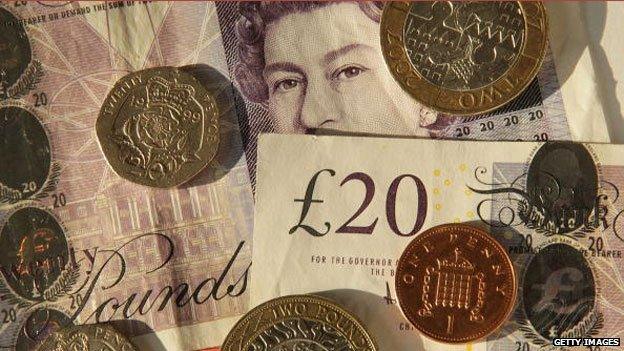US Treasury warns of hung parliament
- Published
- comments

So the US Treasury has noticed there is a general election happening in Britain. This is what a report sent yesterday to Congress said about us:
"The potential for difficult coalition talks, and subsequently the design and implementation of economic policy, is broadly perceived as a material downside risk for businesses and investors".
Or as I mentioned earlier this week, sterling will continue to take the strain (the pound will fall) if investors become more concerned that weak and directionless government will be the consequence of the poll on 7 May.
Broadly, however, the US Treasury paints a positive picture of trends in the British economy - except for the widening to a record level in the current account deficit, the huge imbalance between the money we make from the rest of the world and what we pay the rest of the world (which I've been banging on about for many months).
However, although our deficit may be bad and unsustainable for us, it is imbalances in the other direction - the surpluses of Germany and China - that are of far greater concern in Washington.
Perhaps its big message is that "the global economy should not again rely on the United States to be the only engine of demand" and that "doing so will not lead to a pattern of strong, sustainable and balanced global growth, the very aim of the G20".
It is highly critical of Germany, China, Japan and Korea (in that order) for generating huge current account surpluses (or in the case of Japan, being likely to do so again, thanks to the falling oil price) due to their reliance for growth on exports, rather than domestic consumption and investment.
In other words, it implicitly accuses them of yet again exporting big debts to the rest of the world, to deficit countries like the UK and the US. And you'll recall it was the many years of such global imbalances in the boom years that pumped up debts in much of the west and that in turn was an important cause of the great 2008 crash and recession.
Here is what the Treasury says about Germany:
"The Netherlands and Germany have continued to run very large current account surpluses since 2011, with Germany's surplus growing to an unprecedented 7.8% of GDP in 2014 ($300bn) with oil prices pushing this higher".
In fact, it calculates that Germany's surplus could be $30bn higher this year simply as a direct consequence of the falling oil price and its reduced outlay on imported energy.
Germany's huge surplus isn't just dangerous for the way it creates analogous deficits in countries such as the UK and US. It is also associated with the failure of the eurozone to emerge from its long years of slump.
The Treasury points out that domestic demand in Germany last year rose "only" 1.3%. And it argues that "key to the adjustment process" in the eurozone is "achieving stronger domestic demand growth", that "reducing stubbornly high unemployment will not be possible otherwise" and "achieving sustainable public finance will be more difficult as well".
Strikingly, this argument, that Germany's obsession with generating surpluses and refusal to stimulate domestic expenditure is needlessly and dangerously holding back recovery in the rest of the eurozone, was also made yesterday, external by the world's only celebrity finance minister, Greece's Yanis Varoufakis.
History probably shows, however, that Mrs Merkel is probably no more likely to take instruction on sound economics from a rich deficit country like America than one on the brink of collapse like Greece.